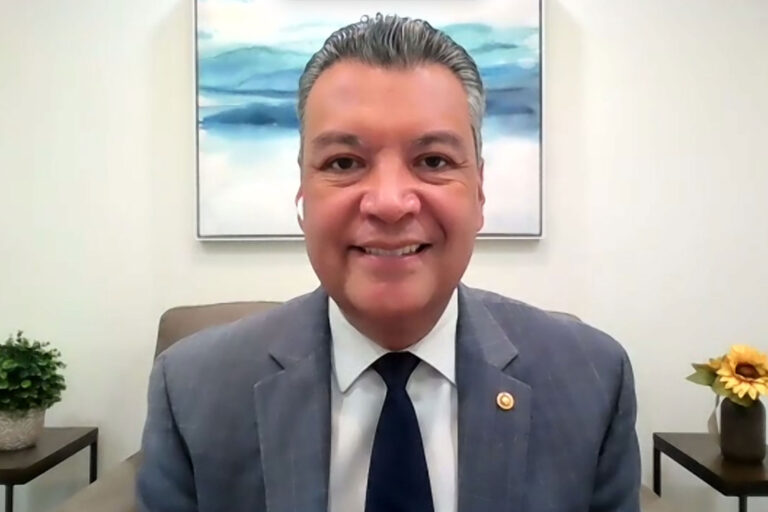PPIC’s Speaker Series on California’s Future invites leaders from across the political spectrum to participate critically, constructively, and collaboratively in public conversations. The purpose is to give Californians a better understanding of how our leaders are addressing the challenges facing our state.
PPIC is a nonpartisan, nonprofit organization. PPIC does not take or support positions on any ballot measure or on any local, state, or federal legislation, nor does it support, endorse, or oppose any political parties or candidates for public office. Any opinions expressed by event participants are theirs alone and do not necessarily reflect any position of the Public Policy Institute of California.
In January, Alex Padilla was sworn in as California’s newest senator, filling the seat vacated by Vice President Kamala Harris. In a virtual event last week, Senator Padilla spoke with PPIC president and CEO Mark Baldassare about what he hopes to get done in Washington.
Padilla said he was very proud that the $1.9 trillion federal relief package—which includes funding for improved vaccine supply and distribution and for direct assistance to families—was among his first votes in the US Senate. In particular, he highlighted the expansion of the federal Child Tax Credit, noting that it could cut the country’s child poverty rate in half and lift 500,000 California children out of poverty.
For the infrastructure proposal that is currently being discussed in Congress, he emphasized a sustainable and inclusive approach. He wants the plan to address climate change and sees it as an opportunity for job creation in underserved communities and a chance to invest not just in roads and bridges but in “water infrastructure, electrical infrastructure, housing, education . . . and more.”
PPIC’s March survey found that Californians across party lines support a path to citizenship for undocumented immigrants. Padilla said that comprehensive immigration reform—including a path to citizenship and more funding for agencies processing asylum requests—is necessary and long overdue. His first piece of legislation introduced in the Senate would grant a path to citizenship for immigrant essential workers.
Padilla affirmed that he is in favor of eliminating the Senate filibuster so that bills could pass with a simple majority, rather than 60 votes, as is now required for most legislation. The filibuster has been “used and exploited to obstruct progress in a number of areas,” he said, citing civil rights in the Jim Crow era and issues of gun safety, voting rights, health care, and climate change.
As California and the nation emerge from the COVID-19 pandemic, Padilla said the experience highlights the importance of access to health care since infectious diseases “do not discriminate between Republicans, Democrats, citizens, noncitizens. . . . We’re all in it together.” He praised the progress California has made on vaccinations, but he also cautioned, “If people stop wearing their masks and are out visiting with others a little too much, too soon, too quickly, we run the risk of sliding back.”
As he looks ahead to the future, Padilla is optimistic. “People have a newfound appreciation for public servants and public service—[and] also a fundamental respect for truth and science to guide our decisions,” he concluded. “We’re going to get through the pandemic. We’re making good progress, we’re doing it together, and we just need to build on that momentum.”



